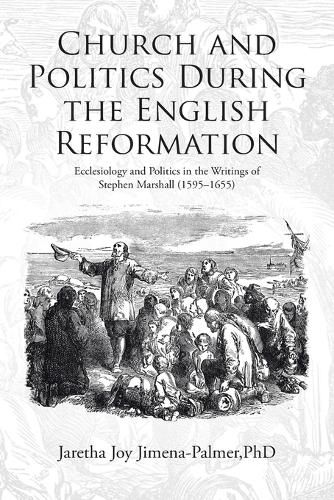Readings Newsletter
Become a Readings Member to make your shopping experience even easier.
Sign in or sign up for free!
You’re not far away from qualifying for FREE standard shipping within Australia
You’ve qualified for FREE standard shipping within Australia
The cart is loading…






This title is printed to order. This book may have been self-published. If so, we cannot guarantee the quality of the content. In the main most books will have gone through the editing process however some may not. We therefore suggest that you be aware of this before ordering this book. If in doubt check either the author or publisher’s details as we are unable to accept any returns unless they are faulty. Please contact us if you have any questions.
This is a literary study of the seventeenth-century pamphlets and sermons delivered to the Long Parliament by Stephen Marshall, a leading English Puritan. Marshall was known as preacher to the Long Parliament and for his participation in the further reformation of the English Church in the 1640s. His understanding of the role of civil magistracy was deeply rooted in his concept of the ?English Reformation.? He was convinced that the constitutional changes during the sixteenth-century English Reformation defined the role of civil magistrates. The King became the ?Supreme Head of the English Church, ? and the civil magistracy consisting of ?King-or-Queen-in Parliament? had the responsibility to spearhead the reformation of the English Church. He also insisted that restoring godly preaching and teaching in every local church would eventually complete the English Reformation.
Marshall also argued that the Henrician schism paved the way for England to become a ?Christian Commonwealth where the Church is lodged, ? whose characteristic was the unity among the people of God. This implied that in England, Presbyterians, Independents, and Erastians all belonged to one body of Jesus Christ, the ?Head of the Church.? In a Christian Commonwealth, civil magistracy was a divine institution and had the highest power of ordering and governing the church, according to Marshall. It was the civil magistracy’s responsibility to protect and to take care of God’s people in all godliness. And in order to do so, magistrates should be rightly informed from the Word of God.
Though Marshall showed his opposition to King Charles I’s political innovation that precipitated an unfortunate war in 1642, his vision of a Christian Commonwealth where English magistracy consisting of the ?King-or-Queen-in-Parliament? did not change. If the king could be persuaded to agree with the ecclesiastical reform Puritans proposed through Parliament, he would still be an instrument of reform.
$9.00 standard shipping within Australia
FREE standard shipping within Australia for orders over $100.00
Express & International shipping calculated at checkout
This title is printed to order. This book may have been self-published. If so, we cannot guarantee the quality of the content. In the main most books will have gone through the editing process however some may not. We therefore suggest that you be aware of this before ordering this book. If in doubt check either the author or publisher’s details as we are unable to accept any returns unless they are faulty. Please contact us if you have any questions.
This is a literary study of the seventeenth-century pamphlets and sermons delivered to the Long Parliament by Stephen Marshall, a leading English Puritan. Marshall was known as preacher to the Long Parliament and for his participation in the further reformation of the English Church in the 1640s. His understanding of the role of civil magistracy was deeply rooted in his concept of the ?English Reformation.? He was convinced that the constitutional changes during the sixteenth-century English Reformation defined the role of civil magistrates. The King became the ?Supreme Head of the English Church, ? and the civil magistracy consisting of ?King-or-Queen-in Parliament? had the responsibility to spearhead the reformation of the English Church. He also insisted that restoring godly preaching and teaching in every local church would eventually complete the English Reformation.
Marshall also argued that the Henrician schism paved the way for England to become a ?Christian Commonwealth where the Church is lodged, ? whose characteristic was the unity among the people of God. This implied that in England, Presbyterians, Independents, and Erastians all belonged to one body of Jesus Christ, the ?Head of the Church.? In a Christian Commonwealth, civil magistracy was a divine institution and had the highest power of ordering and governing the church, according to Marshall. It was the civil magistracy’s responsibility to protect and to take care of God’s people in all godliness. And in order to do so, magistrates should be rightly informed from the Word of God.
Though Marshall showed his opposition to King Charles I’s political innovation that precipitated an unfortunate war in 1642, his vision of a Christian Commonwealth where English magistracy consisting of the ?King-or-Queen-in-Parliament? did not change. If the king could be persuaded to agree with the ecclesiastical reform Puritans proposed through Parliament, he would still be an instrument of reform.